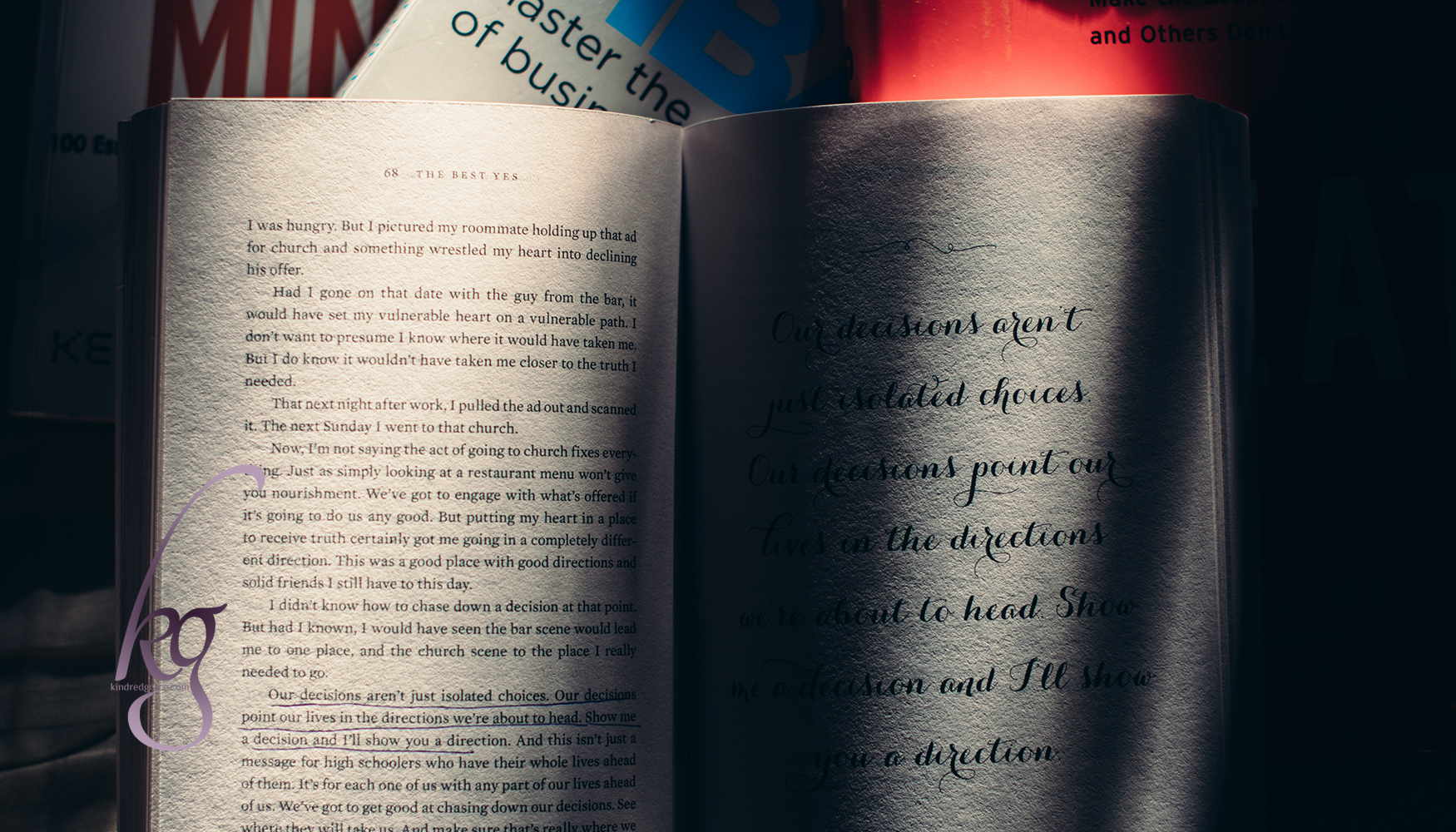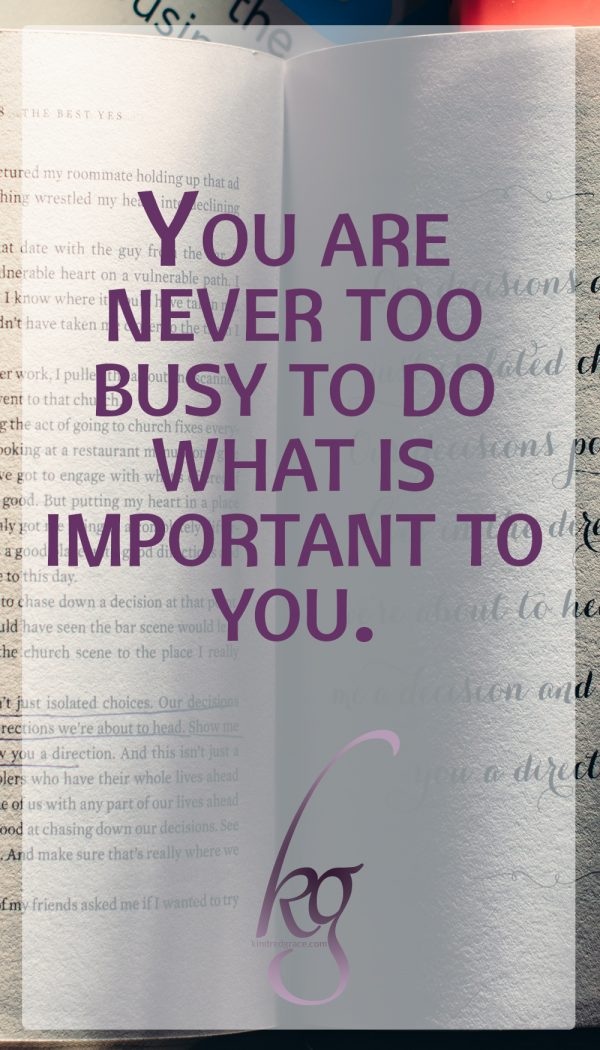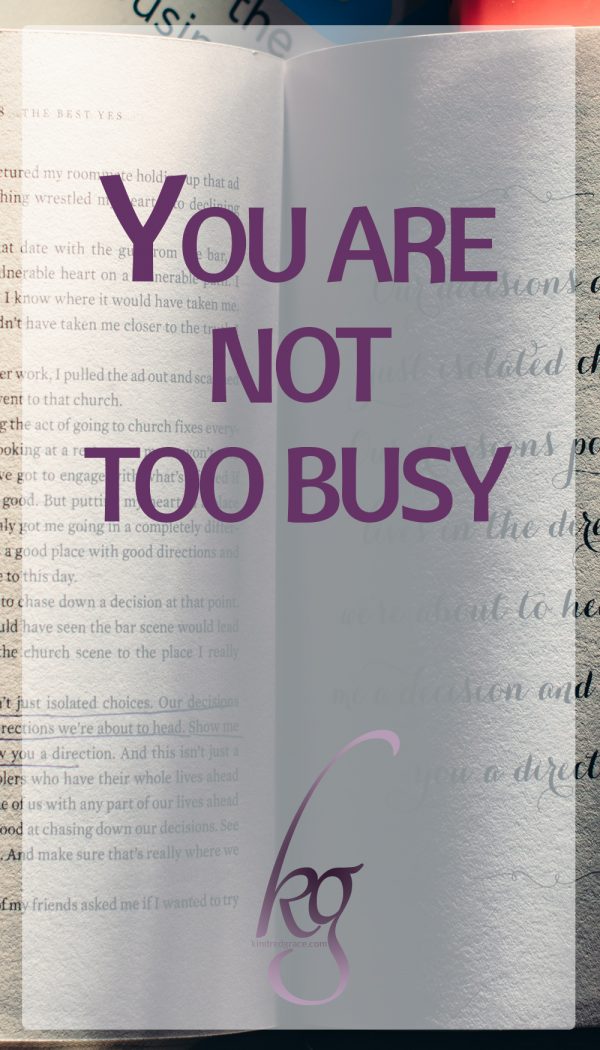You Are Not Too Busy
Disclosure: This post contains affiliate links which won’t change your price.
My mom tells the story of her college days, when she held a part-time job, managed a full class load, had a fulfilling social life, participated in extracurricular activities, turned all her assignments in on time, and maintained a decent GPA. Her classmates who didn’t have a job or extracurricular activities complained about not having enough time and struggled to get their work done well, she said.
“Busy people get a lot done,” she has told me more times than I can count. “If you want something done on time, ask a busy person.”
Her point to me was to convince me that I could juggle a job and school concurrently, but it’s been a principle that has carried me through college (I wasn’t the highest GPA but at least I never pulled an all-nighter) and ten years of career decisions.
But in a recent season of intensity, I started complaining about my workload and whining (yes, whining) about my schedule. Nobody liked me during that season and, full disclosure, I didn’t like myself.
Where I should draw the line between staying productive and becoming too busy? How do I accomplish what I need to while also prioritizing friends and family? How often will I complain about my schedule before I decide to find a solution to the problem?
In his recently published “The Disease of Being Busy,” Omid Safi asks the underlying question poignantly: “When did we forget that we are human beings, not human doings?” While he challenges his reader to take time to have meaningful conversations that don’t just revolve around the task list and hectic schedule and doing of life and to dig deeper into the being of life, I challenge you to the same.
Busy people get a lot done, but that doesn’t mean that busyness is next to godliness. Society’s glorification of busyness has led to overworked, overtired, overweight, overstressed people who won’t put down their phone, don’t understand the meaning of rest, and can’t envision a life without a schedule. I have five mantras that I use to intentionally and deliberately change my thought patterns. Maybe they will help you?
1. You are not defined by your busyness.
For the record, I’m one of those people who appears “too busy.” In addition to normal adulting as a wife and friend and daughter, I am employed full-time while also building a business that is approaching full-time hours. My days are rigorously structured and often start at 4:30am. Despite all the busyness, “busy” is not my identity. I do love structure and schedules (it’s part of my personality!), but my busy is an effect, not a cause. I am not defined by my busyness and neither are you.
My busy is not the cause of my absence from family dinner and it’s not the cause of my exhaustion and it’s not the cause of my stress. Busy is an effect of the choices I have made: I choose to work hard right now so that I can build a business and quit my job, I choose to get up at 4:30am to side-hustle before work so I can spend a quiet evening at home with my husband without my laptop. I choose this life for right now. Emphasis on the “for right now” — I have a clear goal for this season and then the hyper-scheduling will be a distant memory.
2. You are never too busy to do what is important to you.
Have you ever said “no” to something with the excuse “I am too busy”? That’s a lie I’m guilty of telling. I am never too busy to do what is important to me. In fact, on the busiest of weeks I have been known to add in an evening of Netflix because, well, I wanted to. Breakfast dates with my husband are important to me, so they happen even if it means arriving as the restaurant opens before dawn on Saturday morning so we are done in time for that morning’s photoshoot. Going to the gym is important to me, so I schedule to make it happen — it’s literally a blocked-off time slot on my calendar!
Convicted by my tendency to blame my busyness as an excuse, I have started being intentional and honest. “No, I cannot come to your party because I am already scheduled to stay home and recharge my introvert side” isn’t fun to admit (what?! I can’t do everything and all the time??), but at least it isn’t a lie. By building in that white space, though, I save myself a meltdown in the car driving home from a social event. Yes, I have more than once sobbed on the way to or from an event when I chose not to keep that sanity-aid margin in place.
Lysa Terkeurst’s The Best Yes quite literally changed my life when I read it two years ago and has defined my ability to say “no” when it isn’t the best yes and to make decisions for my calendar’s sanity when I feel paralyzed by the options. If you struggle with keeping margin in your life and don’t know how to say “no” or when to say “no”, please go read Lysa’s book.
3. You are not a victim of your calendar.
During this season of two jobs, I am saying “no” a lot more — I miss out on family activities because I choose to have white space in my calendar to recharge my introvert side, I schedule my friends four or more weeks into the future because I choose to prioritize margin in my life. These decisions make me look like a schedule-obsessed dork or appear as though I am not prioritizing my friendships, but it actually means that when I do show up for a party I can be all there and when I do sit down for coffee with a friend, I have the capacity to really listen and truly care.
I refuse to become a victim to my busy. Yes, I’m busy right now. Yes, I am probably busier than I ever thought I would be. But, no, I am not a victim. I chose this path.
Let me say to you: you are not a victim to your busy. Even in your busiest seasons, even in the unavoidable and stressful moments, you do not have to be at the mercy of your schedule. Add in a walk around the block right before a stressful meeting, make time to go grocery shopping so you can eat well on the way to soccer practice, schedule in an evening at home so that you know you have one night a week that you and your family are being and not doing.
I already have a list of things I will choose to do when I am no longer working two jobs (lead a Bible study! take meals to new mothers! spend more time with friends! hike through my bucket list! take my nieces and nephews on fun dates!), but right now my calendar is filled with client meetings and photo sessions after I get home from work. It’s a season of work, but I am not a victim.
Let me also remind you: God is bigger than your schedule. Creating margin, adding in boundaries, and living responsibly are all parts of a spiritual discipline. In her Divine Time Management, Elizabeth Grace Saunders asks the question: “What would it look like to trust God with my time?” I believe it was Martin Luther who said: “I have so much to do that I shall spend the first three hours in prayer.”
As you choose to live not as a victim to your schedule, don’t forget to put God as priority and craft your schedule with Him in mind.
4. You should prioritize rest.
Despite the season’s full schedule, rest remains a priority. I spend one day a week not working and just being (for me, that’s usually Sunday). I do not compromise on sleep, doing my part to remain physically strong and mentally whole. I stay active, walking the neighborhood or hiking a mountain or doing a class at the gym. Keeping these margins not only ensures I live well, but helps me to get my work done efficiently.
Elizabeth Grace also challenged me to take it a step farther: her suggestion is to live in silence for one hour a day. I’m not even sure what that would look like! I talk to my mom while commuting, I love learning through podcasts, I play a Gilmore Girls episode while I cook dinner, I listen to Adventures in Odyssey before bed, I turn on music while reading. I don’t do silence, but now I’m going to try as another way to prioritize rest.
What do you need to do to prioritize rest?
5. You are not too busy.
By personality I will always love having a schedule and completing a to-do list, but that doesn’t mean I will let myself be defined by busyness. I will always make time for what is important to me, I will strive to be in charge of my calendar (not vice versa!), I will prioritize rest.
I won’t always do it well, I may even find myself again overcommitting next week. But as Lysa Terkeurst says: “Wisdom is our silver lining. Wisdom will help us not repeat the mistakes we’ve made but rather grow stronger through them.” She goes on to say that wisdom is evidenced in our actions, “Let’s choose wisdom. Let’s use the two most powerful words, yes and no, with resounding assurance, graceful clarity, and guided power.




We aren’t victims to our busy-ness; I love that thought. Of course, it’s so easy to slide into the victim mentality rather than taking responsibility for our choices or trusting God in difficult times. We have to trust God with our schedules. Well said!
Thank you for this! I loved the Best Yes, too. Definitely a game-changer to remind myself that I’m not a victim of my busy-ness–I have a choice.
lovvvve this <3
Thanks so much for the mention of Divine Time Management! I’m delighted that you found it helpful to enter into God’s rest.
One of my resolutions for this year is to “be human and treat others as humans; be humane.” I’m a very nice person so it’s not about me not being cruel. But about connecting with myself and others as humans not machines or simply mechanisms to accomplish goals.
Rest is an essential part of maintaining that perspective.
God’s best,
Elizabeth Grace Saunders